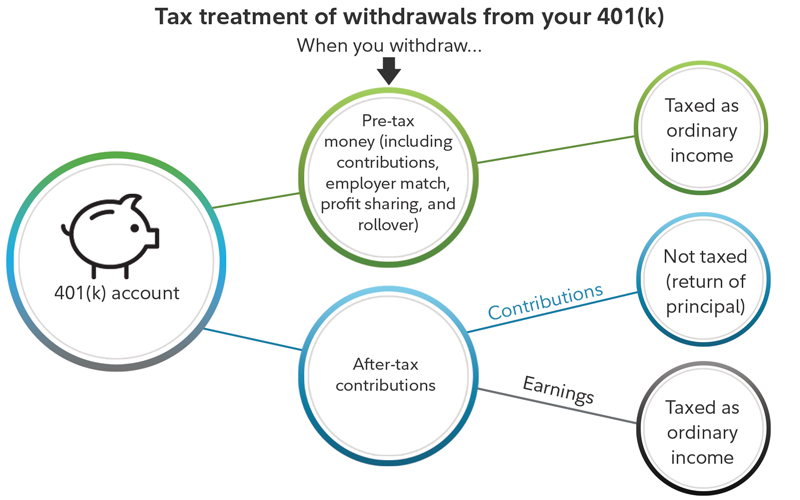The 401 k beneficiary rules after death of the plan owner include the requirement for beneficiaries to pay income tax on the amount of the withdrawals they make from the. If the heir is a surviving spouse a minor child or a disabled person the RMDs continue to be based on the deceased persons age rather than the beneficiarysthat is unless the beneficiary.
 After Tax 401 K Contributions Retirement Benefits Fidelity
After Tax 401 K Contributions Retirement Benefits Fidelity
A spouse who has inherited a 401k plan is expected to have withdrawn all the money in the account within 5 years after their spouses death.

401k after death. Federal law makes you the automatic beneficiary. Can creditors go after 401k after death. When a person dies his or her 401k becomes part of his or her taxable estate.
IRAs inherited before that are grandfathered in and the old stretch rules. This option is the least favorable from an income tax standpoint since the entire distribution is generally taxed in the year of distribution as ordinary income. The 401k plan may require you to take all of the money out of the plan no later than December 31 of the fifth year following the year of the persons death.
As the deceaseds spouse you have more options for managing the account assets than other beneficiaries such as his children or siblings. This will be required by law if no beneficiary is named and the 401k becomes part of the deceaseds estate during probate. The SECURE Acts distribute-within-a-decade rule applies only to IRAs whose original owners died after Dec.
When funds are left in a 401k after death those must be distributed to the benefactor chosen by the participantThe way they are distributed depends on the choices of the company administering the 401k along with personal choices of the benefactor. 401k Distribution after Death. Inheriting a 401k on the death of the account owner isnt always as straightforward as inheriting other types of assets.
A 401k will typically be used to pay off bills and debt after the death of the account holder. 401k investments are fully protected from creditors so long as the estate is not named as the beneficiary of the 401k account. The estate stands good for the debts upon death so if the 401k is not.
The IRS has certain rules that 401k beneficiaries must follow that determine when and how much tax theyll pay to inherit someone elses retirement plan. Typically a 401k participant beneficiary has the option to receive a payout of the entire account balance regardless of the age of the IRA ownerplan participant at death. When your spouse dies almost nothing can get between you and his 401 k.
If your kids benefit from your 401k plan after your death they must begin receiving periodic or lump sum payments from the 401k by the end of the year following your death. In fact most situations will mandate the repayment of debt and bills before a beneficiary can collect any money from the account. You could take a little out each year or wait until the last year to take it all.
How to avoid taxes on your 401k inheritance. If your plan allows them to set up periodic payments they may use either a five-year plan or a lifetime expectancy plan. Withdraw all funds by the end of 10 years after the owners death only if the account owner died in 2020 or later.
As a non-spouse beneficiary funds from an inherited 401 k plan must be distributed by the end of the 10 th year following the year of death 1. However a beneficiary generally wont have to wait until probate is completed to receive the account balance. This is called the 10-year rule.
You have the option of taking out a lump-sum distribution or the required minimum contributions. As the named beneficiary of the plan you should be able to access the money even while the rest of the estate is in probate said Fred Mutter tax manager at Deloitte and Touche. Unless you signed a waiver letting him name someone else the money is yours.
